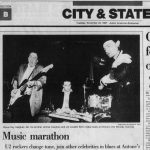Bruce Robison + Kelly Willis: Together Again, A Year Later – Continental Gallery, Post-SXSW 2012
She was the queen of post-modern cred-country. He was the aw-shucks singer/songwriter with the #1 records on George Strait, the Dixie Chicks, and Tim McGraw with Faith Hill. They were the first couple from Texas’ alt-country scene, and separate but equal propositions with their own careers to tend to.
Last South By Southwest, Bruce Robison & Kelly Willis did the unthinkable: they teamed up for the Americana Music Association’s show at Antone’s. More a merging of solo acts than a genuine duo, they were endearing in their awkwardness and engaging in their off-the-cuff camaraderie.
Ahhh, what a difference a year makes!
In the Continental Gallery’s intimate upstairs space, feeling nearly like someone’s living room, the pair were joined by an upright bass player, a drummer with a cocktail kit, and a utility player who can make a steel sob, snarl, bleed, and leave puddles of tears all over the stage.
Opening with Dave Alvin’s “Border Radio,” they time traveled to a place where country music was adult emotions that could only be measured by those late night broadcasts from somewhere in Mexico. Each has a resolute country classicism to them: Willis has a broad-throated catch that’s all angst, regret and the occasional whoop of euphoria, Robison’s that slow Texas songwriter meander that draws on Ray Price, Willie Nelson and even Lyle Lovett sans quirk.
A slight mariachi feel transformed Don Willians’ “We Are All The Way,” the hestitant song of recognizing one’s flaws and willing oneself to find the strength to survive the lapses. When Willis joins her husband, it is two people fighting to survive – and the honesty to their leaning into each other vocally suggests the strength it takes to make it in today’s world.
While each played a few hits – Robison turning in a Broken Spoke-worthy “Wrapped,” Willis igniting Jeannie C. Riley’s brassy “Harper Valley PTA” with all the moxy of someone torching the hypocrites right where they live – this was a show about how two people engage and complement each other, become a pair rather than just partners.
Beyond the obvious integration, there’s also a confidence that has set both freer than either is on their own. Whether it’s the notion they’re onstage with someone who has their back, the shared burden of commanding the audience or the recognition they like singing together, there was a moment on Willis’ signature “What I Deserve,” a song of knowing even in the doubt and knocked down state that your life should be more, where her voice rippled with an intuitive sense of ache that was modulated to a hair’s breath of melodrama.
That same pang of heartbreak permeated “Dreaming,” where the song of recognizing summer’s almost gone and all that will be left are dreams of what had been was rendered with Everly Brothers-style close harmony. Written from the perspective of youth and the intoxication of first love, it never finds overwrought, just the onset of a knowledge one never knew existed and would rather not know.
That sentiment also rose from Hayes Carll’s “Long Way Home,” the elegy written for a friend who died from misadventure far too young. But where the recriminations can be felt in Carll’s raw delivery, there’s a sense of benediction and safe harbor to the couple’s treatment. Folkie in its spare execution, it is country in the high lonesome arc of their vocals.
Not that everything was somber. The quick-tempo “I Was Born To Roll,” equal parts truckers’ anthem and musicians’ battle cry, landed all pluck and attitude, the best aspect of country’s fast songs. With a high flying catch-as-catch-can attack, the “Yeah, yeah” call and response on the outro ratchet up the momentum with much the same velocity as “Ain’t Living Long Like This.”
Equally light-hearted was the ’50s pure pop wrapped in ribbons of ’60s country steel that was “9 Million, 999 Thousand, 999 Tears To Go.” Though a song of absolute heartbreak, the throwback innocence and their delight in the tempo keep it from being a mere sobfest.
Obviously Willis’ voice embodies rejection, loss, and ache with an ease that eludes most singers. But, where she was once a fine vocalist, she now has a delivery that suggests inhabiting the songs over performing them. For Robison, always a halting and sometimes stiff performer, his awkwardness has eased into a more aw shucks thing – the embarrassed partner, the stand by your woman husband who knows he’s lost control of the show; in the process, his vocals have taken on a more broken-in quality.
When each sings, there’s an unabashed commitment to the feelings, not the performing. When they sing together, it is with knowing what the other’s going to do and the intuition feeds their comfort level.
Comfortable is the word. Even in roughest emotional places, they bring the truth to the surface fearlessly. Playing more new songs than would be expected, the material held up.
As the show wound down, Robison and Willis embraced the song McGraw took to #1. “Angry All The Time” is less tense when they do it, more a prayer to find grace and acceptance in the wreckage of what’s happened. A grown-up love song with its priorities in order. Hoping the kids will be okay, it builds bridges between the credible and the mainstream, the minimal and the big production and, ultimately, the selfishness which destroys and the maturity which transcends the pain for equanimity.
To see to artists who’ve made music on their terms, who’ve had greater success than the results might indicate and who’ve had to labor under the yoke of being critically acclaimed – and all the expectations that brings – it’s intriguing to see the pair find both enjoyment as musicians and such contentment as a team.
Though it is hard to walk away from the career one has built, sometimes the risk is worth the end result. Sometimes 1+1 can equal five. Certainly for this pair, it does.




